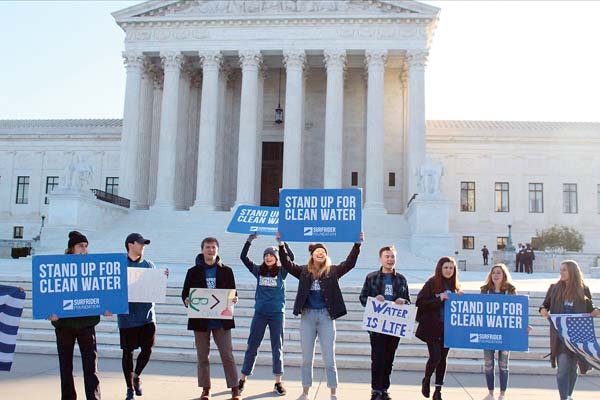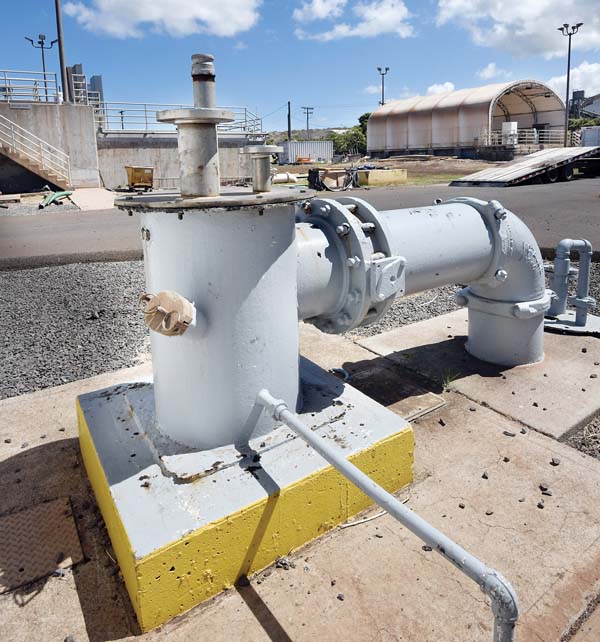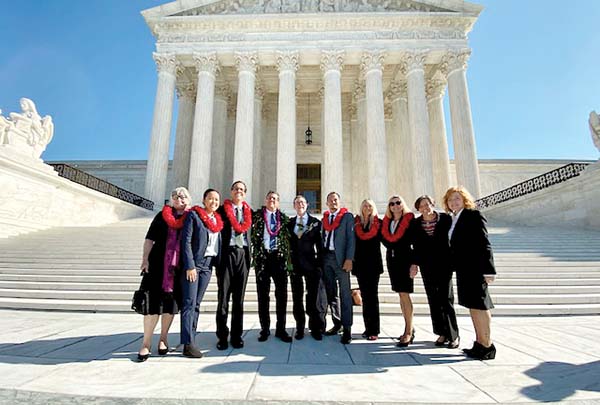 |
 |
Maui case gets day in high court
|
Supreme Court hears arguments in Lahaina injection wells case
The Maui News
November 7, 2019
LOCAL NEWS
COLLEEN UECHI
Assistant City Editor
cuechi@mauinews.com

Members of the Surfrider Foundation show support for the Clean Water Act outside the U.S. Supreme Court, where oral arguments in the County of Maui v. Hawaii Wildlife Fund case were held Wednesday morning. The Hawaii Wildlife Fund, West Maui Preservation Association, Surfrider Foundation and Sierra Club-Maui Group sued the county over its use of injection wells in 2012. CHANDLER MCDOWELL photo
Lawyers on both sides of the longstanding Lahaina injection wells case delivered their oral arguments Wednesday before the U.S. Supreme Court, whose ultimate ruling could determine how the federal Clean Water Act is used to regulate pollution to protected waters.
The U.S. Supreme Court will decide whether Maui County violated the Clean Water Act by disposing of wastewater through injection wells at its Lahaina Wastewater Reclamation Facility, which four environmental groups said in a 2012 lawsuit was reaching the ocean and damaging coral reefs. Maui County has argued that it doesn't need permits under the Clean Water Act because the treated wastewater has not been entering the ocean directly, but rather indirectly through groundwater.
Both sides argued their cases Wednesday morning before the justices, who have between now and June to issue a ruling.
"To me, I'll be so happy when this is finally decided so the reefs can get the relief they need," said Hannah Bernard, executive director of Hawaii Wildlife Fund, one of the plaintiffs. "While we're waiting for a decision, the reefs are still suffering. But I'm glad that we're moving toward a final stage."
Maui County Mayor Michael Victorino also traveled to Washington, D.C., to hear the oral arguments in person.

An injection well at the Lahaina Wastewater Reclamation Treatment Facility pumps treated water from the sewage system into the ground in this photo taken in September. The four injection wells at the facility are the focal point of a federal Clean Water Act case before the U.S. Supreme Court. The Maui News MATTHEW THAYER photo
"It was an honor to be present and witness the Supreme Court justices' consideration of the issues raised by the County of Maui, the plaintiffs and federal regulators," Victorino said in a statement Wednesday. "Their questions were insightful, and I felt that they truly understood the complexity of the issues in this case and the potential effects of the expansion of the Clean Water Act on governmental entities and private properties."
The case has reached the Supreme Court after lower courts ruled against Maui County. In 2014, the U.S. District Court in Hawaii ruled that the county's use of injection wells was a violation of the Clean Water Act. The county appealed to the 9th U.S. Circuit Court of Appeals and lost in February 2018. The court denied the county's request to reconsider the ruling in March 2018.
However, in February of this year, the U.S. Supreme Court agreed to hear the case after circuit courts around the country produced different rulings on the reach of the Clean Water Act.
David Henkin, staff attorney from Earthjustice's Mid-Pacific office, argued on behalf of the plaintiffs Wednesday.
"I think the entire strategy was to try and get the court to really grapple with whether a polluter like Maui County can evade the Clean Water Act by using the groundwater as a sewer to pollute the ocean," Henkin said afterwards via telephone. "Because that is so contrary to the basic purpose and the actual text of the Clean Water Act, which seeks to ensure that people do not add pollution to surface waters like the ocean unless they're complying with the Clean Water Act permit."

Earthjustice attorneys and the plaintiffs in the Lahaina injection wells case stand outside the U.S. Supreme Court on Wednesday. The justices heard oral arguments Wednesday morning on whether Maui County's use of injection wells is a violation of the federal Clean Water Act. The Hawaii Wildlife Fund, West Maui Preservation Association, Surfrider Foundation and Sierra Club-Maui Group sued the county over the injection wells in 2012. Photo courtesy Hannah Bernard
Henkin said that "it really doesn't matter whether pollution goes directly into the ocean or goes via groundwater; it still gets into ocean," and the point of the Clean Water Act is to protect the quality of the ocean. He was "pleased" with the questions that the justices asked.
"I've been lawyering for far too long to read into a judge's question, or in this case a justice's question, in how they ultimately will rule, but I was pleased to see they were asking about the right things," Henkin said. "They got what the issue is, and we'll see what they do with it."
Maui County's attorney, Elbert Lin of the Virginia law firm Hunton Andrews Kurth, did not respond to a request for comment by Wednesday afternoon. However, he said in his opening statements to the court that "this case is not about whether the releases from Maui's underground injection wells should be regulated at all but how."
Lin said that the county is already regulated under several existing state and federal environmental programs, and that the text of the Clean Water Act makes it clear that the trigger for a permit "is not where a pollutant comes from but how it reaches navigable waters." He said that requiring a permit in this case would impose federal permits on thousands of other similarly operated wells in Hawaii and across the U.S.
Bernard, who was in Washington, D.C., on Wednesday, said that "there's nothing new that hasn't already been outlined" in the lower courts, but that she was interested to hear what the justices had to say. She said they focused a lot on how the wastewater reached the ocean and what counts as "a point source and a nonpoint source."
Bernard never expected and never wanted the case to get to this point. She's a biologist who jumped into action around 2007 in response to a state study on the decline of Hawaii's coral reefs. She and other concerned citizens started raising community awareness and working with the county and the U.S. Environmental Protection Agency on solutions.
While there were some changes, they weren't happening fast enough, and Bernard said community members were concerned about the county relying on injection wells as a primary source of wastewater disposal instead of as a backup. In 2012, the Hawaii Wildlife Fund, West Maui Preservation Association, Surfrider Foundation and Sierra Club-Maui Group filed the lawsuit.
"We were compelled by the fear that the reefs were collapsing and that we needed to act quickly," Bernard said. "And here we are 10 years later. And guess what? The reefs are worse."
Their fears were further confirmed by a University of Hawaii dye tracer study released in 2013 that showed effluent from at least two injection wells was reaching the ocean.
County officials have said that they also want to find alternative ways of disposing of the treated wastewater, but that other measures are costly, and that if they were subjected to permits under the Clean Water Act, individual homeowners whose septic tank and cesspool systems also leach into the groundwater could be liable as well.
Earthjustice attorneys have brushed those arguments aside as fearmongering. A state Department of Health official said in September that the state already has rules in place for individual wastewater systems and would not start cracking down on them if the county settled the case.
Meanwhile, Victorino and the Maui County Council have been at odds over whether to settle the case. Fearing impacts to the Clean Water Act and not wanting Maui County to be associated with the case, the council voted 5-4 in September on a resolution to settle and withdraw the case. Last month, Victorino announced he would still be moving forward. The council is considering hiring an outside attorney to get a ruling from the courts about who has the authority in this instance.
"This case has never been about winning or losing," Victorino said Wednesday. "It's about clarity in the law so that we can move forward, confident as to the clear boundaries of the law so we can implement our programs and practices accordingly. I look forward to the court's decision."
Henkin said he's "long since given up" on guessing what the county might do in this case, but Bernard still is holding out hope that they will withdraw before the Supreme Court issues a ruling.
"At this point, I'd still like to see the case withdrawn, because honestly, no one can predict what the final outcome and decision will be," she said. "So I still don't want to take the chance of changing the intent and the letter of the Clean Water Act."
Bernard also wasn't happy about the county continuing to spend taxpayer dollars on the case, from the $4.3 million in litigation fees to the funds used to send administration officials to Washington, D.C. Travel costs, including airfare, hotel accommodations and per diem allowances, totaled $14,842 for five county officials — $3,000 for Victorino, $2,800 for Corporation Counsel Moana Lutey, $2,800 for Deputy Corporation Counsel Richelle Thomson and a combined $6,242 for Environmental Management Director Eric Nakagawa and acting Wastewater Division Chief Scott Rollins.
When asked why Victorino went to Washington, D.C., when he is not involved in arguing the case, Communications Director Brian Perry said that the mayor "is charged under the charter with the responsibility of ensuring that the departments carry out their functions in accordance with laws and regulations.
"The climate change litigation and the lawsuit brought against the county related to the Lahaina injection wells are the two most important legal issues currently involving the county," Perry said. "Mayor Victorino believes that these issues deserve his involvement and first-hand attention."
Perry said that the other officials "served as resource personnel to help the legal team prepare oral arguments before the Supreme Court." He said that five mock trial sessions were held in preparation.
Council Chairwoman Kelly King's office said Wednesday that the council woman did not travel to Washington, D.C., and that she did not have any comments about the oral arguments or the mayor's expenses.
A full transcript of Wednesday's oral arguments can be found at www.supremecourt .gov/oral_arguments/argument_transcripts/2019/18-260_m6hn.pdf.
Audio will be available Friday at www.supremecourt.gov /oral_arguments/argument_audio/2019.
* Colleen Uechi can be reached at cuechi@mauinews.com.
Original article URL:
https://www.mauinews.com/news/local-news/2019/11/maui-case-gets-day-in-high-court/
BACK TO WMPA
HOME PAGE
|


